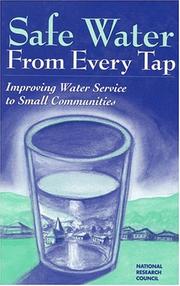| Listing 1 - 10 of 65 | << page >> |
Sort by
|
Book
ISBN: 3031184122 3031184114 Year: 2023 Publisher: Cham, Switzerland : Springer,
Abstract | Keywords | Export | Availability | Bookmark
 Loading...
Loading...Choose an application
- Reference Manager
- EndNote
- RefWorks (Direct export to RefWorks)
Nature-based solutions (NbS) are solutions inspired or supported by nature. They include ecosystem conservation and restoration measures, as well as the creation or enhancement of natural processes in man-made ecosystems, such as cities. Recent interest in NbS has emphasized their importance for urban water management and cities across the world have begun to experiment with them. Experiences from different contexts, however, are not adequately captured and understood. This book aims to address this gap by compiling case studies and reviews that explore NbS for urban water management from different regions and perspectives and highlight emerging challenges and opportunities for harnessing their potential.
Municipal water supply. --- Environmental aspects. --- Cities and towns --- Urban water --- Water, Municipal --- Water, Urban --- Municipal engineering --- Water-supply
Book
ISBN: 3805309333 9783805309332 Year: 1987 Volume: 2 Publisher: Mainz am Rhein : Philipp von Zabern,
Abstract | Keywords | Export | Availability | Bookmark
 Loading...
Loading...Choose an application
- Reference Manager
- EndNote
- RefWorks (Direct export to RefWorks)
Water-supply --- Eau --- History --- Approvisionnement --- Histoire --- Municipal water supply --- -Cities and towns --- Urban water --- Water, Municipal --- Water, Urban --- Cities and towns --- Municipal engineering --- History. --- Municipal water supply - History
Book
ISBN: 923102194X 9789231021947 Year: 1983 Publisher: Paris Unesco
Abstract | Keywords | Export | Availability | Bookmark
 Loading...
Loading...Choose an application
- Reference Manager
- EndNote
- RefWorks (Direct export to RefWorks)
Municipal water supply. --- Sewage --- Purification. --- Effluent treatment --- Purification of sewage --- Sewage treatment --- Water treatment --- Cities and towns --- Urban water --- Water, Municipal --- Water, Urban --- Municipal engineering --- Water-supply --- Disinfection --- Municipal water supply --- Purification

ISBN: 030905527X 0309522846 0585026319 9780585026312 9780309055277 030505527X 0309175437 Year: 1997 Publisher: Washington, D.C. : National Academy Press,
Abstract | Keywords | Export | Availability | Bookmark
 Loading...
Loading...Choose an application
- Reference Manager
- EndNote
- RefWorks (Direct export to RefWorks)
Drinking water --- Water-supply engineering --- Municipal water supply --- Cities and towns --- Urban water --- Water, Municipal --- Water, Urban --- Engineering, Water-supply --- Water-supply --- Municipal engineering --- Civil engineering --- Engineering --- Hydraulic engineering --- Water --- Purification
Book
ISBN: 1282060864 9786612060861 0821378678 0821378929 Year: 2009 Publisher: Washington, DC : World Bank,
Abstract | Keywords | Export | Availability | Bookmark
 Loading...
Loading...Choose an application
- Reference Manager
- EndNote
- RefWorks (Direct export to RefWorks)
This volume will serve as a useful tool for those who wish to diagnose, analyze, and take action against systemic corruption in the water and sanitation sectors. On a global scale, more than 1 billion people live without access to safe, potable water, in part because of poor governance and corruption. Illegal connections and substantial losses caused by deferred maintenance have eroded the revenues of water utilities, leading to a downward spiral in performance. Embezzlement of funds, bribes for access to illegal water connections, manipulation of meter counters, and collusion in public contra
Municipal water supply --- Sanitation --- Government policy. --- Corrupt practices. --- Cleanliness --- House drainage --- Sanitary affairs --- Sanitation services --- Sanitation systems --- Cities and towns --- Urban water --- Water, Municipal --- Water, Urban --- Water-supply --- Environmental health --- Hygiene --- Public health --- Sanitary engineering --- Municipal engineering
Book
ISBN: 1299356044 0262313618 9780262313612 0262518392 0262018853 9781299356047 9780262018852 9780262518390 9780262313629 0262313626 Year: 2013 Publisher: Cambridge, MA : MIT Press,
Abstract | Keywords | Export | Availability | Bookmark
 Loading...
Loading...Choose an application
- Reference Manager
- EndNote
- RefWorks (Direct export to RefWorks)
"Attempts by local governments to privatize water services have met with furious opposition. Activists argue that to give private companies control of the water supply is to turn water from a common resource into a marketized commodity. Moreover, to cede local power to a global corporation puts communities at the center of controversies over economic globalization. In Contested Water, Joanna Robinson examines local social movement organizing against water privatization, looking closely at battles for control of local water services in Stockton, California, and Vancouver, British Columbia. The movements in these two communities had different trajectories, used different tactics, and experienced different outcomes. Robinson analyzes the factors that shaped these two struggles. Drawing on extensive interviews with movement actors, political leaders, and policymakers and detailed analysis of textual material, Robinson shows that the successful campaign in Vancouver drew on tactics, opportunities, and narratives from the broader antiglobalization movement, with activists emphasizing the threats to local democracy and accountability; the less successful movement in Stockton centered on a ballot initiative that was made meaningless by a pre-emptive city council vote. Robinson finds that global forces are reshaping local movements, particularly those that oppose neoliberal reforms at the municipal level. She argues that anti-water privatization movements that link local and international concerns and build wide-ranging coalitions at local and global levels offer an effective way to counter economic globalization. Successful challenges to globalization will not necessarily come from transnational movements but rather from movements that are connected globally but rooted in local communities."--Publisher's description.
Water utilities --- Municipal water supply --- Privatization --- Denationalization --- Privatisation --- Cities and towns --- Urban water --- Water, Municipal --- Water, Urban --- Water companies --- Water-supply --- Contracting out --- Corporatization --- Government ownership --- Municipal engineering --- Public utilities --- E-books --- ENVIRONMENT/General --- ENVIRONMENT/Environmental Politics & Policy

ISBN: 0195072804 9780195072808 9780199728213 0199728216 1280441372 9781280441370 0197560261 9786610441372 1601298609 9780197560266 Year: 1993 Publisher: New York Oxford University Press
Abstract | Keywords | Export | Availability | Bookmark
 Loading...
Loading...Choose an application
- Reference Manager
- EndNote
- RefWorks (Direct export to RefWorks)
This is the first examination of the impact of technological developments on ancient Greek cities. Drawing on material from many disciplines, the author examines water system elements as they relate to each other and to the physical, historical, and social bases of ancient Greek cities. She concludes that increased knowledge and skill in management of water contributed directly to the urbanization of the ancient Greek world.
Municipal water supply --- Water resources development --- Cities and towns, Ancient --- Cities and towns --- Urban water --- Water, Municipal --- Water, Urban --- Municipal engineering --- Water-supply --- Energy development --- Natural resources --- Management --- History. --- Management&delete& --- History
Book
ISBN: 0821308963 Year: 1987 Publisher: Washington,D.C. The World Bank
Abstract | Keywords | Export | Availability | Bookmark
 Loading...
Loading...Choose an application
- Reference Manager
- EndNote
- RefWorks (Direct export to RefWorks)
Municipal water supply --- Water-supply engineering --- Waterworks --- Water works --- Water-supply --- Engineering, Water-supply --- Civil engineering --- Engineering --- Hydraulic engineering --- Water --- Cities and towns --- Urban water --- Water, Municipal --- Water, Urban --- Municipal engineering --- Planning --- Purification
Book
ISBN: 9264292667 9264292659 Year: 2018 Publisher: Paris : OECD,
Abstract | Keywords | Export | Availability | Bookmark
 Loading...
Loading...Choose an application
- Reference Manager
- EndNote
- RefWorks (Direct export to RefWorks)
Water and its improved governance are critical for economic growth, social inclusiveness and environmental sustainability. Three years after the adoption of the OECD Water Governance Principles, this report takes stock of their use and dissemination. It provides a water governance indicator framework and a set of evolving practices for bench-learning, building on lessons learned from different countries and contexts. Based on an extensive bottom up and multi-stakeholder process within the OECD Water Governance Initiative (WGI), these tools are conceived of as voluntary methodologies to be carried out at country, region, basin and/or city levels to improve water policies. The indicator framework is composed of a traffic light system based on 36 input and process indicators and a checklist with questions on a number of more specific governance conditions. The framework concludes with an action plan to help prioritise steps towards better design and implementation of water policies.
Water-supply --- Municipal water supply --- Government policy --- Management. --- Government policy. --- Availability, Water --- Water availability --- Water resources --- Natural resources --- Public utilities --- Water resources development --- Water utilities --- Cities and towns --- Urban water --- Water, Municipal --- Water, Urban --- Municipal engineering
Book
ISBN: 9783030946432 Year: 2022 Publisher: Cham Springer International Publishing :Imprint: Springer
Abstract | Keywords | Export | Availability | Bookmark
 Loading...
Loading...Choose an application
- Reference Manager
- EndNote
- RefWorks (Direct export to RefWorks)
Water harvesting. --- Municipal water supply. --- Cities and towns --- Urban water --- Water, Municipal --- Water, Urban --- Municipal engineering --- Water-supply --- Harvesting, Water --- Precipitation trapping --- Rainwater catchment --- Rainwater harvesting --- Runoff collection --- Water conservation --- Rainwater --- Runoff irrigation
| Listing 1 - 10 of 65 | << page >> |
Sort by
|

 Search
Search Feedback
Feedback About UniCat
About UniCat  Help
Help News
News